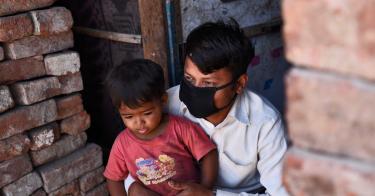The COVID-19 pandemic has left no one unscathed, least of all the world’s already vulnerable refugees and internally displaced persons. World Refugee Day should prompt us to reflect on how countries around the globe can step up to alleviate this new layer of suffering among refugee populations.
The United Nations Refugee Agency reports that 2019 witnessed the highest level of individuals fleeing violence since World War II. The onset of a pandemic in 2020 made a bad situation even worse by increasing vulnerabilities for already-displaced persons and likely set the stage for further displacement of other communities.
In Asia, refugee crises come in all shapes and sizes. From displaced Burmese Muslim Rohingya in Bangladesh, to North Koreans fleeing to freedom, to the potential for new refugee populations emanating from China, the needs are great, and the demands for assistance are high. The U.S. should continue to lead.
Rohingya refugees
The world braced itself for news of the first case of COVID-19 to be reported at the world’s largest refugee camp in Cox’s Bazar, Bangladesh. It arrived on May 15. The camp is home to more than 900,000 Rohingya refugees where social distancing is a physical impossibility. Compounded with a lack of access to medical care and the Bangladeshi government’s decision to limit access to information, the conditions create a perfect storm for a potentially massive outbreak of the novel coronavirus.
Rohingya have already endured so much. In August 2017, the Burmese military drove them from their homes. The UN believes that the Burmese military went further than that, perpetrating genocide and crimes against humanity among this oppressed Muslim minority.
The U.S. has yet to issue an atrocity determination—a decision the secretary of state has the authority to make at any point in time. Now is a particularly auspicious moment. Should the U.S. decide to take this step, it would go a long way toward galvanizing aid from around the globe to alleviate the plight of Rohingya, particularly in the midst of vast and ever-increasing humanitarian needs during COVID-19. But Rohingya are far from the only refugees suffering during the pandemic.
The people of North Korea
Many worry about the effects of COVID-19 on the people of North Korea. An oft-overlooked population are refugees who had dared crossing the 38th parallel to seek freedom. According to Liberty in North Korea (LiNK), an organization devoted to smuggling North Korean refugees to freedom, they have had to suspend rescue operations. LiNK anticipates that few, if any, of those wishing to flee the regime will make it out of North Korea this year due to COVID-19 travel restrictions.
And what of the North Korean refugees who managed to get out of the country but had not yet made it to freedom when the outbreak began? They may now be stuck in third countries like China or other parts of Southeast Asia. Due to COVID-19 regulations in those countries, their movement is also likely to be restricted. In fact, one report indicated that jails in Thailand, usually full of North Korean refugees waiting for their refugee claims to be processed in South Korea, now sit empty.
While North Korean authorities claim there have been zero cases of COVID-19, policy changes in Pyongyang suggest otherwise. Increased border controls and reductions in trade between North Korea and China are likely to have dire impacts on food security and economic stability inside the country.
Should North Koreans’ lives get even harder due to the COVID-19 restrictions, we may well see a spike in the number of refugees fleeing once those restrictions are relaxed. The U.S. should watch closely to see whether the rate of resettlement in South Korea begins to increase as restrictions in North Korea are eased and maintain contact with on-the-ground groups involved in smuggling North Koreans to freedom.
Other critical conditions
The pandemic also facilitated conditions that may lead to additional displacement elsewhere. The Chinese Communist Party (CCP) in China has seized on the moment of distraction to undermine political liberties in Hong Kong. The CCP’s steady erosion of freedom in the special administrative region may, in fact, create more refugees, particularly if the Chinese government opts for a military intervention.
The United Kingdom has already offered visas to approximately 300,000 Hong Kong citizens. And Taiwan’s President Tsai Ing-wen has said she will offer safe haven to Hong Kongers fearing persecution at the hands of Beijing. In the U.S., Congress is considering legislation that would extend Priority 2 refugee status to the people of Hong Kong. It has been heartening to see the world come together to support Hong Kongers who are witnessing an historic loss of freedom.
The situations in Burma, North Korea, and China are emblematic of the various forms of suffering refugees face. Though vastly different from each other, each presents an opportunity for the U.S. and its allies to lead in promoting freedom.
Prioritizing refugees is often the most practical thing the U.S. can offer to hurting populations suffering at the hands of their own governments. When governments abrogate their duty to protect and defend their citizen’s rights, other freedom-loving nations must step in to fill the gap. Sometimes it involves resettling refugees within our own borders; other times it means providing aid and assistance to frontline states. Both promote the national interests of the U.S.
COVID-19 added insult to injury for many refugee populations. Their suffering, already so great, was only amplified by the global pandemic. While other countries may be tempted to turn inward as they combat their own novel coronavirus outbreaks, the U.S. should lead in assistance and encourage others to do the same.
This piece originally appeared in The Ethics and Religious Liberty Commission



